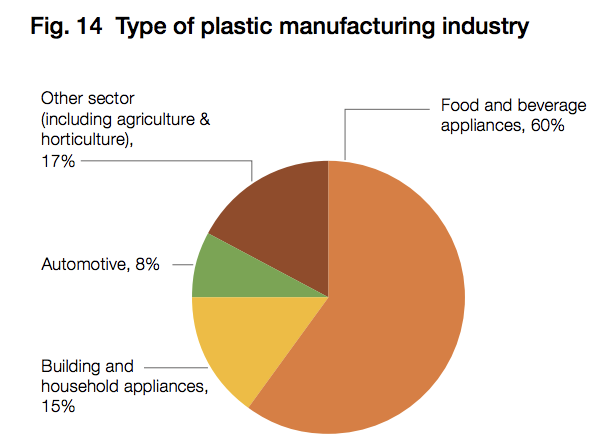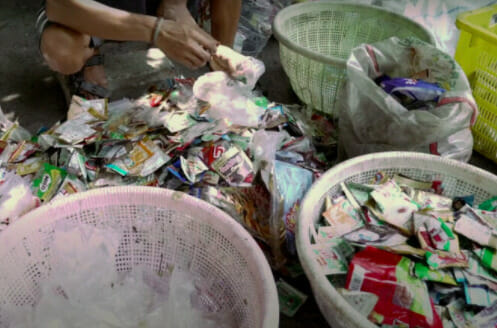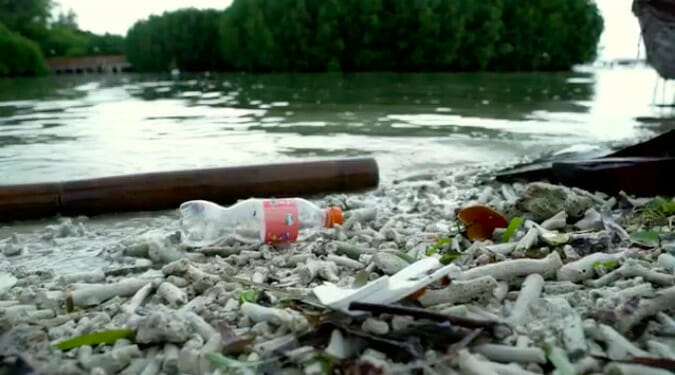As Indonesia faces a plastic waste emergency, environmentalists have turned to art to highlight the severity of this issue. A “plastic museum” was created from 10,000 plastic waste items to address the increasing damage caused by single-use plastic on ecosystems and marine life.
In recent years, there has been an increasing global concern about plastic pollution as it threatens food safety and quality, human health, coastal tourism, and contributes to climate change.
Indonesia has been branded as the second-largest ocean plastic polluter behind China. One of the core issues underlined in the National Plastic Waste Reduction Strategic Actions for Indonesia by the Ministry of Environment and Forestry was the growing discrepancy between the country’s increasing plastic waste and the slow waste recycling rate.
Although Indonesia’s plastic consumption per capita and per year is lower than in other Southeast Asian countries, it is the food and beverage industry that is the major plastic user in Indonesia, with 60% of all plastic produced or imported used in this industry.

The majority of the plastic used for packaging is made of polymers that are low value and more difficult to recycle. This leads to a lower recycling rate and greater plastic pollution in the ocean, rivers, and land.
An environmental solution also needs to be accompanied with socio-economic incentives and aid.
The government has attempted to find solutions, but several regulations have been implemented without much success. In 2017, Indonesia committed to 30% waste reduction and 70% waste handling by 2025.
Current government efforts are inadequate to curb the problem, as consumers still lack wide support to transition out of single-use plastic. We must consider why consumer goods continue to be packaged in small sachets for single use.
Yet, two years after it banned single-use plastic in mini-markets, researchers have found that the policy was largely inefficient as traditional markets still widely use plastic bags.
The reason for this is that products in sachets, including shampoo, detergent, and coffee target the middle and lower class, who can only afford to buy these small quantities on a daily basis. An environmental solution also needs to be accompanied with socio-economic incentives and aid.

ART: A DRIVER FOR CHANGE
Studies have shown that art can help increase understanding and knowledge of environmental issues. It does so by improving presentations, improving public campaigns and general awareness-raising, aiding facilitation and community development, reinforcing values and beliefs, and lastly, helping to build a culture that is environmentally sustainable.
Indonesian environmentalists hoped that by translating the plastic waste crisis of their country into art pieces and exposing them, they could raise greater awareness and incite behavioural changes amongst the population.
Related Articles: Will We Ever Solve the Plastics Problem? | Using Art to Combat Climate Change: An Interview with Louis Masai
In the city of Gresik in the East Java province of Indonesia, members of the Ecological Observation and Wetlands Conservation, as well as several environmentalists, students, villagers, and businesses came together to create a “plastic museum” from 10,000 plastic waste items to address the increasing damage caused by single-use plastic. They used discarded bottles, bags, sachets, and straws, all collected from nearby rivers and beaches.
Its aim: to convince the Indonesian population to rethink their habits and incite them to use reusable items.
The public can be seen walking through the “Terowongan 4444” or the 4444 tunnel, which has been entirely built from plastic bottles collected within three years. The crisis of plastic waste in Indonesia is so immense that it is no longer limited to the ocean but now also affects Indonesia’s rivers.
Indonesian environmentalists have created a museum made up of over 10,000 pieces of collected plastic, highlighting the world’s worsening marine crisis ⤵️ pic.twitter.com/WEttlISdNh
— Al Jazeera English (@AJEnglish) October 12, 2021
Prigi Arisandi, an Indonesian biologist, environmentalist, and founder of the museum, asserts that “every day individuals throw away three bottles of either bottled water or soft drinks, in three years around 4,444 plastic bottles are consumed and generally used once, and then thrown away.”
The exhibition’s centre piece is a statue of Dewi Sri goddess of prosperity, widely worshipped by the Javanese, which has been entirely made from plastic sachets. The emotive message here is clear: plastic waste has severely modified and endangered Indonesia’s landscape, impeding sustainable prosperity in the country. Through Art, environmentalists hope to bring the plastic-waste crisis closer to home in order to ignite greater change.
The outdoor “plastic museum” in East Java, Indonesia, thus aims to highlight the importance of this issue, and Indonesia’s significant part in it. And at the same time, put pressure on the government to face the plastic waste emergency more seriously, and find solutions that could help the entire country to transition out of single-use plastic.
Editor’s Note: The opinions expressed here by Impakter.com columnists are their own, not those of Impakter.com. — In the Featured Photo: Plastic Bottle washed up Indonesian river. Featured Photo Credit: Landscape Indoesia.










